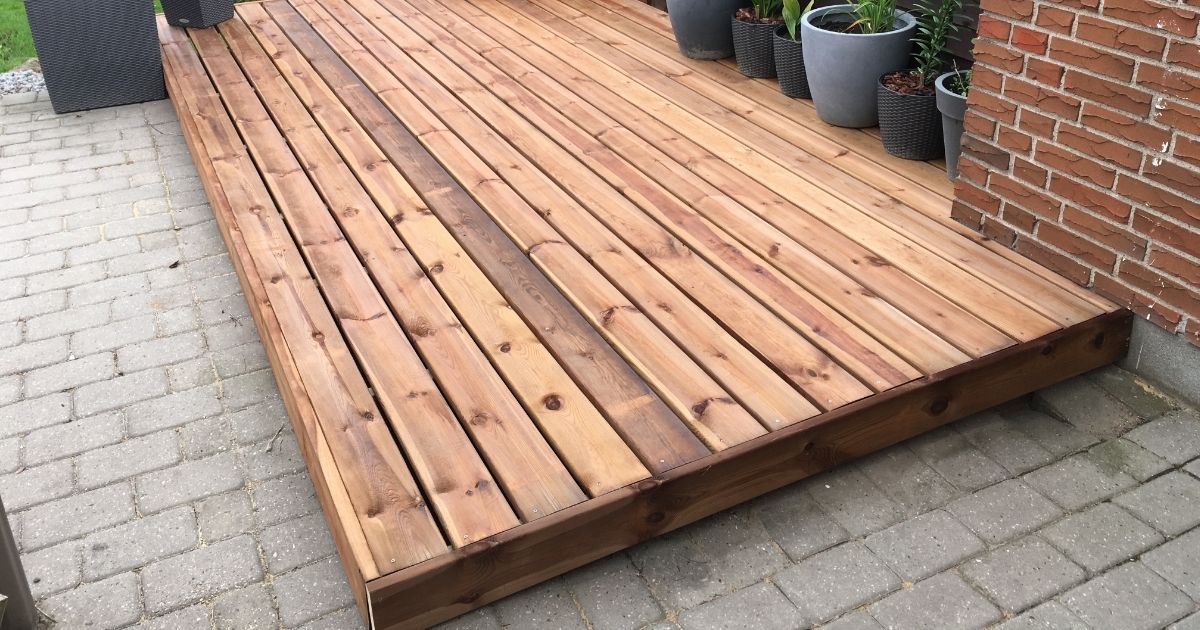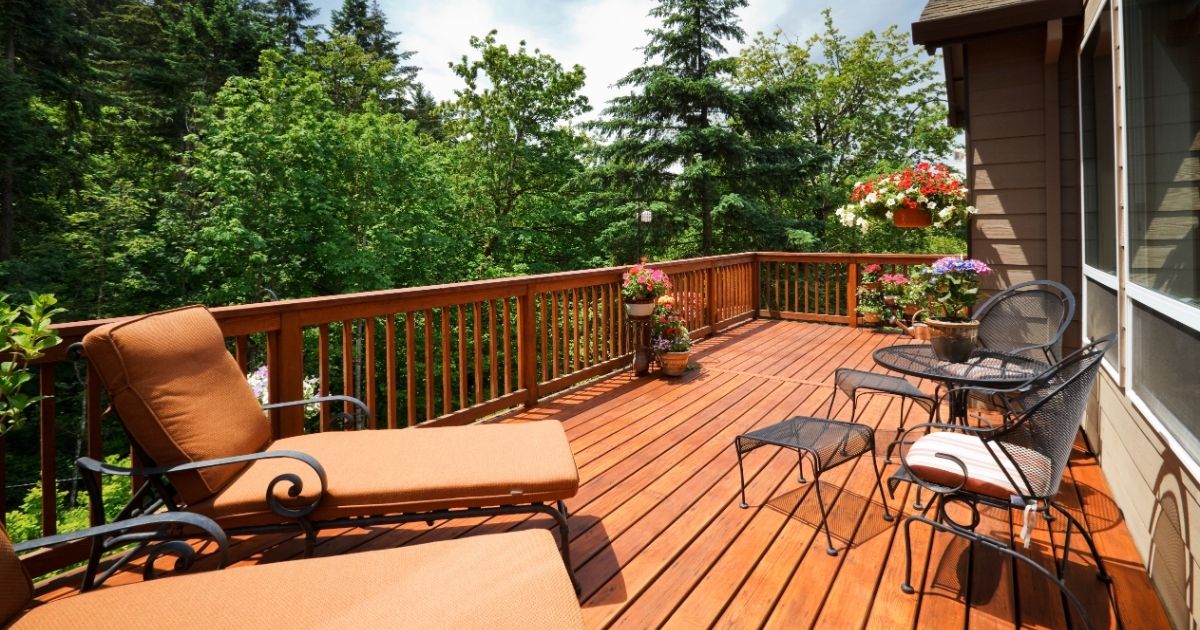At Legacy Decking, we know that choosing between a floating deck and an attached deck can feel like a big decision. Both styles can transform your backyard into a functional, beautiful space for relaxing, entertaining, and enjoying the outdoors.
In this guide, we’ll break down the pros and cons of each option, so you can confidently choose the one that best fits your needs, budget, and lifestyle.
What Is a Floating Deck?

A floating deck sometimes called a ground level deck, floating patio deck, or free-standing deck is a platform that’s not physically connected to your home.
Instead of traditional deep-set footings, it rests on deck blocks or concrete deck blocks, which support the deck frame just a few inches above the ground.
Common Floating Deck Styles
- Ground Level Floating Deck – Ideal for open backyards or patio extensions.
- Small Floating Deck – Perfect for compact yards or cozy garden spaces.
- Floating Backyard Deck – Creates a secondary outdoor gathering spot away from the house.
- Composite Floating Deck – Low-maintenance and long-lasting.
- Floating Steps for Deck – Allows access from multiple sides.
Key Features
- Frame: Built with pressure-treated lumber or composite framing materials.
- Deck Boards: Options include cedar decking, composite decking, or other weather-resistant materials.
- Support: Deck blocks positioned under beams and joists for stability.
- Height: Usually a few inches above the ground for easy access.
What Is an Attached Deck?

An attached deck is built directly onto your home, secured with a ledger board. This type of deck creates a seamless flow from indoors to outdoors, often connecting through sliding doors or French doors.
Common Attached Deck Features
- Integrated Frame: Anchored to the house with joist hangers, beams, and posts.
- Extended Living Space: Functions like an outdoor room for dining, entertaining, or relaxing.
- Height Flexibility: Can be built level with your home’s door threshold or elevated.
- Permanent Structure: Often considered part of the home’s square footage.
Pros of a Floating Deck
Floating decks are popular for good reason. Here’s why we often recommend them:
1. Easier Installation
- No need for deep footings, just place deck blocks in position.
- Often doesn’t require permits (check local codes).
- Can be built with standard tools in less time than an attached deck.
2. Cost-Effective
- Uses fewer materials than an attached deck.
- Lower labor costs if you hire a professional, and significant savings for DIY projects.
- Works well with budget-friendly decking materials like cedar or composite boards.
3. Location Flexibility
- Can be built almost anywhere in your yard.
- Ideal for spaces under mature trees, near gardens, or in sunny corners of the backyard.
4. Avoidance of Tree Roots
- Since no deep digging is required, you won’t disturb existing landscaping or tree roots.
5. Minimal Site Impact
- Limited excavation protects the natural landscape.
- Adding landscape fabric beneath helps prevent weed growth.
Cons of a Floating Deck
While floating decks have many benefits, there are trade-offs:
1. Lower Stability
- Without being anchored to the house, a floating deck can shift during severe weather.
- Uneven ground may cause sections to sink or sag.
2. Maintenance Needs
- Weeds can grow underneath without a barrier.
- Occasional re-leveling may be needed over time.
3. Limited Lifespan
- Being close to the ground increases moisture exposure, which can lead to rot if using natural wood.
- Composite decking can help extend longevity.
4. Lower ROI
- Because they’re not permanent structures, floating decks may not add as much value to your property.
Pros of an Attached Deck
Attached decks offer advantages that many homeowners love:
1. Convenient Access
- Directly accessible from your home, often through sliding or French doors.
- Makes moving food, drinks, and guests between indoors and outdoors effortless.
2. Stability and Strength
- Anchored with a ledger board and supported by beams and joists.
- Can support heavy loads like furniture, grills, and even hot tubs.
3. Integrated Design
- Seamlessly blends into your home’s architecture.
- Can be finished to match your siding, trim, and style.
4. Higher ROI
- Seen as a permanent upgrade that increases property value.
- Often appraised as part of your usable living space.
5. Enclosure Options
- Can be screened in or roofed for protection from the elements.
- Extends your usable outdoor season.
Cons of an Attached Deck
These decks do come with some challenges:
1. More Complex Installation
- Requires permits, inspections, and strict code compliance.
- More labor-intensive to construct.
2. Higher Cost
- More materials and hardware are needed.
- Professional installation is often the best choice.
3. Risk of Water Damage
- Improper flashing around the ledger board can lead to water intrusion.
- Professional installation helps avoid long-term structural issues.
Side-by-Side Comparison
Key Factors to Consider When Choosing
When helping our clients choose between a floating deck and an attached deck, we evaluate several important factors that affect cost, design, and long-term performance.
1. Budget
Floating decks generally cost less to build, especially if you use budget-friendly materials like cedar decking or pressure-treated wood.
Attached decks may have a higher initial cost but can provide a better return on investment due to their anchored and fixed design.
2. Yard Layout
Floating decks are ideal for backyard areas with uneven earth, sloped terrain, or mature trees where you want to avoid disturbing roots.
Attached decks work best when there’s easy access from a door and a clear location to integrate with the home’s perimeter.
3. Intended Use
If you plan on hosting social gatherings or adding heavy features like a shed or hot tub, an attached deck offers stronger support and stability.
For creating a great place to relax, sit, or enjoy a smaller space in the backyard, a floating deck works beautifully.
4. DIY vs Professional Build
Floating decks can be installed with basic tools and are often manageable for DIY projects, especially when the installation area is straightforward.
Attached decks typically require professional expertise, more complex construction, and precision to ensure the joists, boards, and corners are properly secured.
5. Longevity
Composite decking, quality boards, and a well-constructed deck frame extend the life of both deck types.
Attached decks, being anchored to the home, generally last longer, while floating decks may need periodic adjustments to prevent sink or break issues caused by shifting soil.
Our Perspective
At Legacy Decking, we’ve built both floating and attached decks for all types of backyards.
Floating decks are a great choice for flexibility, easy installation, and working around landscaping. Attached decks shine when you want a long-term investment that blends seamlessly with your home.
We recommend considering:
- How you’ll use the deck day-to-day.
- Where it will be placed in your yard.
- What materials best suit your maintenance preferences and climate.
Final Thoughts
Both floating and attached decks can be a great place for relaxing, entertaining, and creating a functional deck area in your backyard.
If you want a cozy shed-side platform, extra storage space, or a beautiful new deck for hosting social gatherings, each option has its advantages.
Your decision will come down to cost, intended use, yard layout, and how much permanence you want. Consider factors like joist spacing, quality boards, and whether you’ll need more blocks for added stability. Even small choices, such as using sand for leveling or leaving a slight gap between boards, can affect long-term performance.
If you’re ready to start building your dream deck, our team at Legacy Decking can design and construct a structure that fits perfectly with your ground level or elevated space. From initial installation to the finishing touches, we’ll make sure your deck blends durability, beauty, and function for years to come.
FAQs
What are the disadvantages of a floating deck?
A floating deck’s main disadvantages include lower stability compared to an attached deck, potential shifting or sinking on uneven ground, and a generally shorter lifespan due to increased moisture exposure at ground level.
Without proper installation, including landscape fabric or a gravel base, weeds can grow underneath. Floating decks may also provide lower return on investment because they’re considered less permanent than decks attached to a house.
How long will a floating deck last?
With proper construction and quality materials, a floating deck can last 10 to 15 years on average.
Using composite decking, treated lumber for the deck frame, and ensuring good drainage underneath can extend its lifespan. Regular maintenance, such as cleaning debris, sealing wood, and re-leveling deck blocks, will help prevent premature wear from moisture and ground movement.
Is it better to attach a deck to a house or not?
Whether it’s better to attach a deck depends on your goals.
An attached deck offers greater stability, seamless indoor-outdoor access, and can improve property value by integrating with your home’s design.
A floating deck, however, provides location flexibility, simpler installation, and often lower costs making it a great choice for yards with mature trees or where avoiding house attachment is preferred. Your decision should be based on budget, yard layout, and intended use.
Are floating decks any good?
Yes, floating decks can be an excellent option for creating an outdoor living space quickly and affordably. They’re easy to install, require minimal site disruption, and can be placed almost anywhere in the yard.
While they may not match the durability or ROI of an attached deck, a floating deck is ideal for homeowners who want a functional, attractive, and flexible backyard deck without a major construction project.
Do I need gravel under a floating deck?
While gravel isn’t always required, adding a gravel base under a floating deck is highly recommended.
Gravel improves drainage, reduces moisture buildup that can cause wood rot, and helps prevent weeds from growing underneath. It also creates a more stable surface for deck blocks and minimizes movement caused by soil shifting.





.svg)
.svg)









